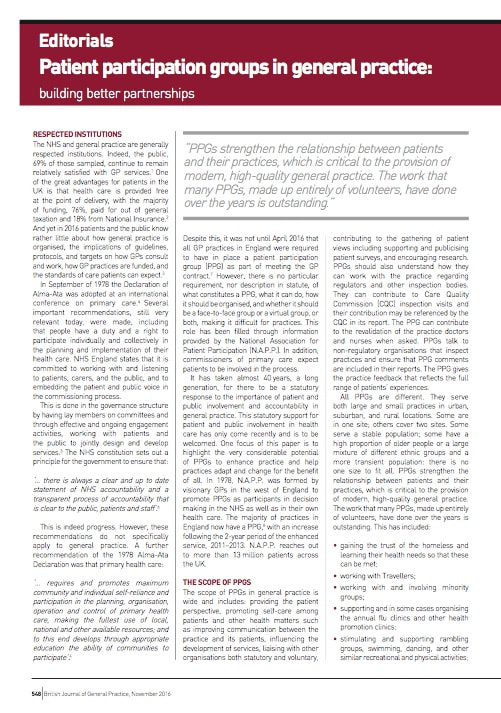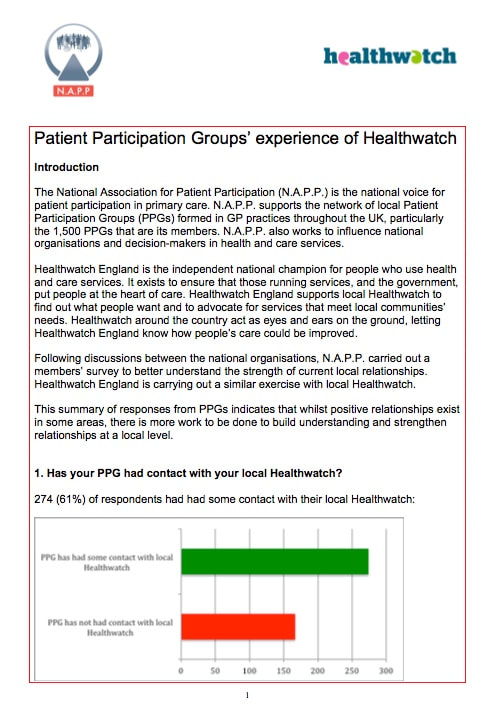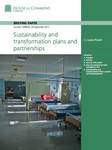NEWS - OCTOBER 2017
CQC - NEW STRATEGY FOR PUBLIC ENGAGEMENT
https://www.networks.nhs.uk/networks/news/cqc-public-engagement-strategy-2017-2021
The Care Quality Commission has published a new strategy for how they will engage with the public to make them an even stronger regulator that is always on the side of people using care services.
They plan to focus on the following four priorities over the next for years.
https://www.networks.nhs.uk/networks/news/cqc-public-engagement-strategy-2017-2021
The Care Quality Commission has published a new strategy for how they will engage with the public to make them an even stronger regulator that is always on the side of people using care services.
They plan to focus on the following four priorities over the next for years.
INFORMATION FOR PPGs
There are seven leaflets on this site that may be of interest: www.napp.org.uk/bbp.html
1. Building Better Participation ... 7 pages
2. Getting PPGs in Place ... 8 pages
3. Helping PPGs Work Well ... 12 pages
4. Knowing and Working with Patients ... 8 pages
5. Influencing Beyond the GP Practice ... 8 pages
6. Self Assessment Sheet ... 1 page
7. Making Online GP Services Work Well for Patients ... 8 pages
There are seven leaflets on this site that may be of interest: www.napp.org.uk/bbp.html
1. Building Better Participation ... 7 pages
2. Getting PPGs in Place ... 8 pages
3. Helping PPGs Work Well ... 12 pages
4. Knowing and Working with Patients ... 8 pages
5. Influencing Beyond the GP Practice ... 8 pages
6. Self Assessment Sheet ... 1 page
7. Making Online GP Services Work Well for Patients ... 8 pages
|
PPGs IN GENERAL PRACTICE
2 pages BJGP editorial, ‘Patient Participation Groups in General Practice: building better partnerships’
|
|
WAS LOCAL HEALTHWATCH USEFUL?
4 pages N.A.P.P. (National Association of Patient Participation) and Healthwatch England used N.A.P.P.’s Annual Conference at the end of June 2017, to launch the summary [attached] of a survey of N.A.P.P. members, designed to find out what their experiences of local Healthwatch groups were. |
8.00am - 8.00pm GPs
Vincent Cable [Leader of the Liberal Democrats]
To ask the Secretary of State for Health, if he will provide a list of which
(a) regions and (b) clinical commissioning groups provide an 8am to 8pm primary care service to patients.
Hansard source (Citation: HC Deb, 25 October 2017]
Steve Brine ]The Parliamentary Under-Secretary of State for Health]
There is no requirement for general practice to deliver an 8am to 8pm service.
As set out in the General Practice Forward View published in April 2016, NHS England is providing additional funding “to enable CCGs to commission and fund extra capacity across England to ensure that by 2020, everyone has access to GPservices, including sufficient routine appointments at evenings and weekends to meet locally determined demand, alongside effective access to out of hours and urgent care services.”
The Government has committed to 100% of the population being able to access general practitioner appointments in the evenings and weekends to meet locally determined demand by April 2019.
A list of current regions and clinical commissioning groups (CCGs) delivering 8am to 8pm services is not routinely held centrally by NHS England. However, data was collected in April 2017 and at this point 59 CCGs were delivering an 8am to 8pm service. A list of these is attached.
Vincent Cable [Leader of the Liberal Democrats]
To ask the Secretary of State for Health, if he will provide a list of which
(a) regions and (b) clinical commissioning groups provide an 8am to 8pm primary care service to patients.
Hansard source (Citation: HC Deb, 25 October 2017]
Steve Brine ]The Parliamentary Under-Secretary of State for Health]
There is no requirement for general practice to deliver an 8am to 8pm service.
As set out in the General Practice Forward View published in April 2016, NHS England is providing additional funding “to enable CCGs to commission and fund extra capacity across England to ensure that by 2020, everyone has access to GPservices, including sufficient routine appointments at evenings and weekends to meet locally determined demand, alongside effective access to out of hours and urgent care services.”
The Government has committed to 100% of the population being able to access general practitioner appointments in the evenings and weekends to meet locally determined demand by April 2019.
A list of current regions and clinical commissioning groups (CCGs) delivering 8am to 8pm services is not routinely held centrally by NHS England. However, data was collected in April 2017 and at this point 59 CCGs were delivering an 8am to 8pm service. A list of these is attached.
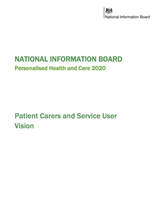 7 pages
7 pages
FOR PATIENTS, CARERS AND SERVICE USERS
A Paper describing how the government and national health and care organisations aim to use information technology within current programmes to improve health and social care services in England.
https://www.gov.uk/government/publications/personalised-health-and-care-2020-service-user-vision
What will be different across a wide range of services
Patients, carers and service users should experience improvements to how health services use digital technology.
These changes will:
If you're generally healthy and want to stay that way, you will be able to find online information and advice that you can trust.
A Paper describing how the government and national health and care organisations aim to use information technology within current programmes to improve health and social care services in England.
https://www.gov.uk/government/publications/personalised-health-and-care-2020-service-user-vision
What will be different across a wide range of services
Patients, carers and service users should experience improvements to how health services use digital technology.
These changes will:
- Give patients, carers and service users more information about, and control over, services that will work around their needs.
- Give people better support to take more control of, and responsibility for, their own health and wellbeing.
- Reduce or get rid of many of the things that people can find frustrating or inefficient about using health and care services.
- Give people confidence that whichever services they use, the right people have access to the right information.
- Help different services to work better together so people can move more quickly and easily between services without noticing the joins, whether services are delivered by the NHS, care homes, home care services, local councils or other providers.
- Give people more information about how services use their data to understand how their treatments have worked.
- Help people know how to decide which information they are happy for researchers and planners to use, to develop new and improved treatments and services.
- Make it much easier for people who are blind or partially sighted to use electronic information than previous systems based on paper records and letters and help people with other communication needs.
If you're generally healthy and want to stay that way, you will be able to find online information and advice that you can trust.
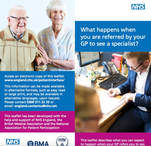
REFERRED BY A GP?
Members of the national working group and, specifically, NHS England, British Medical Association (BMA) and the National Association for Patient Participation (NAPP), have come together again to produce a patient facing leaflet, so that patients know what they can expect to happen if they are referred by their GP to see a specialist or consultant at a hospital or a community health centre.
Click on the image to download the leaflet ...
Members of the national working group and, specifically, NHS England, British Medical Association (BMA) and the National Association for Patient Participation (NAPP), have come together again to produce a patient facing leaflet, so that patients know what they can expect to happen if they are referred by their GP to see a specialist or consultant at a hospital or a community health centre.
Click on the image to download the leaflet ...
|
SUSTAINABILITY AND TRANSFORMATION PLANS AND PARTNERSHIPS
House of Commons Library ... 30 pages http://researchbriefings.parliament.uk/ResearchBriefing/Summary/CBP-8093 |
NHS sustainability and transformation partnerships are a mechanism for delivering the NHS Five Year Forward View (5YFV) and other national priorities for the NHS in England. The 5YFV, published in October 2014, was a collective vision for how the health service needed to change between 2015/16 and 2020/21.
Forty-four sustainability and transformation partnerships now exist covering the whole of England, although they vary considerably in the size of the area they cover and the populations they serve. Each of the forty-four footprints are separate partnerships made up of NHS organisations, including clinical commissioning groups (CCGs), NHS trusts and foundation trusts and primary care services, as well as local authorities.
This House of Commons Library briefing covers the context in which STPs have been developed, their funding and accountability arrangements as well as their progress so far. A key role of these partnerships was the creation of local blueprints for delivering the 5YFV, known as sustainability and transformation plans (STPs). This briefing, therefore, explores how these plans were developed, as well as research and debate surrounding the content and implementation of these plans.
Commons Briefing papers CBP-8093
Forty-four sustainability and transformation partnerships now exist covering the whole of England, although they vary considerably in the size of the area they cover and the populations they serve. Each of the forty-four footprints are separate partnerships made up of NHS organisations, including clinical commissioning groups (CCGs), NHS trusts and foundation trusts and primary care services, as well as local authorities.
This House of Commons Library briefing covers the context in which STPs have been developed, their funding and accountability arrangements as well as their progress so far. A key role of these partnerships was the creation of local blueprints for delivering the 5YFV, known as sustainability and transformation plans (STPs). This briefing, therefore, explores how these plans were developed, as well as research and debate surrounding the content and implementation of these plans.
Commons Briefing papers CBP-8093








